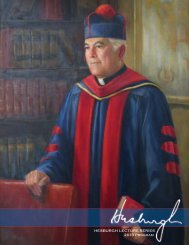HESBURGH LECTURE SERIES 2012 Program - Alumni Association ...
HESBURGH LECTURE SERIES 2012 Program - Alumni Association ...
HESBURGH LECTURE SERIES 2012 Program - Alumni Association ...
Create successful ePaper yourself
Turn your PDF publications into a flip-book with our unique Google optimized e-Paper software.
Harvey A. Bender, Ph.D.<br />
Professor, Biological Sciences; Director, Human Genetics <strong>Program</strong><br />
Biography<br />
Harvey Bender is a professor of biological sciences and director of the Human Genetics<br />
<strong>Program</strong> at the University of Notre Dame. He also serves as adjunct professor of medical<br />
genetics at the Indiana University School of Medicine. Bender received his undergraduate<br />
training at Case Western Reserve University, majoring in chemistry and English. His graduate<br />
studies in developmental genetics were undertaken at Northwestern University, where he<br />
received both his M.S. and Ph.D. degrees. Bender served as a U.S. public health fellow in Categories<br />
genetics at the University of California (Berkeley) and has held postdoctoral positions as a<br />
Ethics, Family, Science, Social<br />
Gosney Fellow at the California Institute of Technology, and as a visiting professor at the Yale<br />
University School of Medicine and Law. His active research activities involve the epidemiology<br />
Concerns<br />
of human genetics disease, and the scholarship of teaching and learning. Bender is a fellow of<br />
the American <strong>Association</strong> for the Advancement of Science, a founding fellow of the American<br />
College of Medical Genetics, and a fellow of Notre Dame’s John J. Reilly Center for Science, Technology, and Values. Bender was<br />
the founding director of the Regional Genetics Center at South Bend Memorial Hospital, which was sponsored by the University<br />
of Notre Dame, Indiana State Department of Health, Indiana University School of Medicine, and the Memorial Hospital of South<br />
Bend. He presently serves as the director of the Cancer Genetics & Risk Assessment Center of the Saint Joseph Regional Medical<br />
Center of South Bend, Ind.<br />
Bender was elected a Carnegie Scholar by the Carnegie Foundation in 2001, and a Kaneb Teaching Fellow at the University of<br />
Notre Dame in 2003. In 2006, Governor Mitch Daniels named Bender a recipient of the Distinguished Hoosier Award, one of the<br />
highest honors given by the State of Indiana to its citizens.<br />
Lectures<br />
Altered Destinies: Genetic Advances and Social Implications<br />
Advances in genetic technology are often over optimistically hailed in the press and by the general public as panaceas to<br />
eliminate human misery. On the other hand, the pessimists among us are more likely to voice recurring fears of a white-coated<br />
Dr. Frankenstein. Neither, of course, has it right. The new genetic technologies are not products of “mad” science. Nor do they<br />
offer instant solutions to long-standing questions of human health and heritage. But as the gateways to a new and broader<br />
understanding of our genetic destinies and concomitant social choices, they need to be part of our collective storehouse of<br />
biological knowledge. Only an informed public can deal rationally and ethically with the many new choices before us. This lecture<br />
will review advances in genetics that have so absorbed the public interest in the past decade: the human genome project, the<br />
identification of genes that cause disease, and the development of diagnostic tests and treatments for such disorders. This, in turn,<br />
will serve as the framework and foundation for a discussion of our social and ethical responsibilities and options that will confront<br />
us all in the decades to come.<br />
Genetic Enhancement and the Brave New Millennium: Science, Politics, and the<br />
Human Genome<br />
Bender believes that Aldous Huxley wouldn’t be the least surprised to learn that the instruction set detailing information as to<br />
how each of us develops from our beginning as a one-cell egg through our infancy, childhood, and adulthood is now available<br />
with the announced near completion of the Human Genome Project, which has both mapped and chemically delineated the<br />
entire array of human genes. However, it is doubtful that even his fertile imagination could have envisioned the impact of such<br />
endeavors ranging from the redefinition of health and disease to the commercialization and interest conflicts of the industrial and<br />
scientific communities. Are we now about to embark upon a future where genetic enhancement will be the norm? This discussion<br />
will explore some of the exciting genetic advances of the last decade and present some potential challenges facing our society this<br />
new millennium.<br />
12 The Hesburgh Lecture Series, <strong>2012</strong> <strong>Program</strong>



